growing learning adapting to change
This section opens and closes with an assessment about adaptability and change
The core content covers how to create habits of growing, learning, and adapting to change
The scenario/story video will cover a situation of what to do when there is too much to know/learn
The overall focus for this section is how to maintain knowledge, skills, and concepts in an ever-changing and expanding IT landscape
A Mindset of Continual Learning
Why?
- Continuous learning is an option and a necessity for staying relevant and effective
- Learning new skills → Applying in practice → Receiving feedback → Refining approaches → [Repeat]
Making learning a must
- Prioritizing learning supports personal growth and keeps you agile in a rapidly evolving field
- Integrating learning into your daily work
- Creating a learning-friendly environment
- Make learning part of workload assessment and planning
Preparing to be uncomfortable
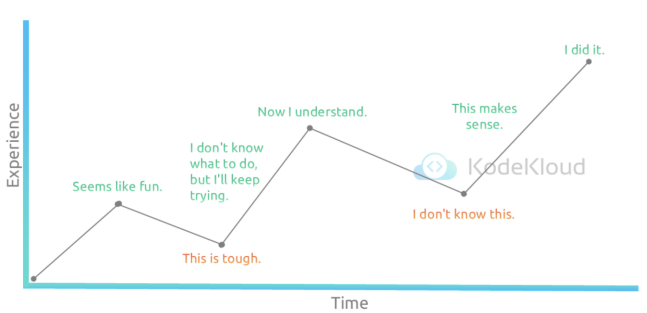
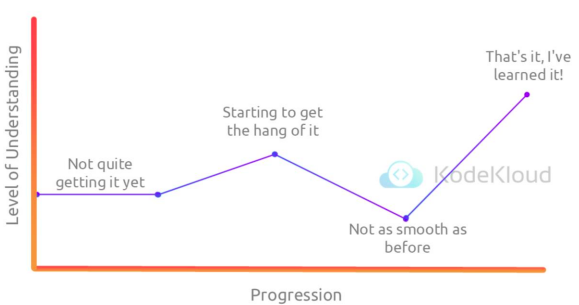
- Learning requires the mindset to accept that at first, you may "not know the answers", "not be good at something" or "Not see immediate results"
- Success lies in the small habits and choices you make every single day
Risk of stagnation
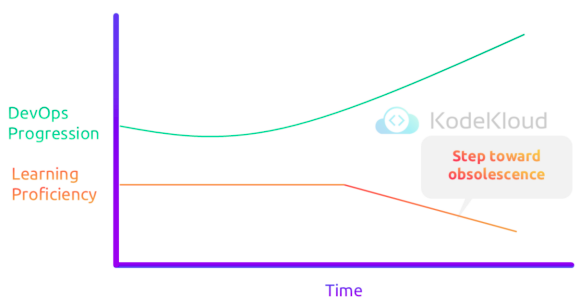
- In a rapidly evolving field, stagnation halts progress and leads to obsolescence
Accepting new tools and new ideas
- Embrace change for innovation, survival, and success
Beyond technical skills
- This includes areas like collaboration, communication, leadership, and strategic thinking
Growing your value to the business
- As you grow, your value to the business grows especially in areas that the business needs
- Learn → Business → Value
Summary
- A mindset of continual improvement is necessary to be in the right frame of mind to grow and learn
- This section covered the various benefits of having a learning mindset
- There are many risks particularly in IT if you do not grow your skills, concepts, and new ways of working
- Growing your skills increases your value and your value to the business for which you work
Rituals for Growth and Learning
Why?
- Cultivating strong learning habits is the key to staying ahead
- Start → Learning → Skill development → Professional growth → Success
Identifying learning opportunities
- Explore areas that align with your passions and interests
- Stay updated on industry trends related to business, project, and work
- Request feedback from peers, both inside and outside your company or industry
- Learn from failure to improve future success
- → Every challenge and task presents a unique opportunity for learning and growth
Setting learning goals
- Set goals for direction and measurement
- Make your goals SMART (Specific, Measurable, Achievable, Relevant, Time-bound)
- Balance passion with realism and past experience
- Track your progress regularly
- → You don't have to learn everything, just relevant things!
Creating a learning routine
- A learning routine is a time-boxed, repeatable commitment to do, learn, and grow every day
- Learning is a marathon, not a sprint
Leveraging resources and tools
- Learning platforms and resources
- Digital tools (apps, note-taking systems, courses)
- Communities and networks
- Personal learning toolkit
Applying learning in practice
- Understand the concept
- Practice in a safe environment
- Apply it to a real project
- RReflect on the outcome
- → Learning is only as valuable as its application in real-world scenarios
- → Knowledge is potential, application is where the real power lies
Summary
- This section is all about habits of learning and growing
- Setting learning goals that are S.M.A.R.T. and relevant to your business, organization, department, or project is essential
- Tracking those goals and balancing passion with relevancy are important
- This is a lifelong journey, more like a marathon than a sprint, so engage it with an eye on sustainability
The Truth About Skill Acquisition
Why?
- Learning new tech skills is tough but common because transforming knowledge into competence is inherently challenging
- Common skill areas: Cloud computing, AI, blockchain, scripting, and automation
Time, effort, and failure
- Skill acquisition requires time, sustained effort, and the willingness to fail along the way to success
Realistic expectations
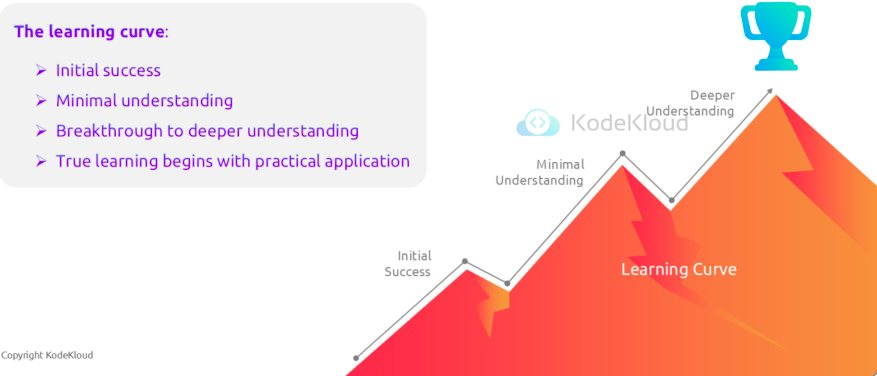
Learning to love mistakes
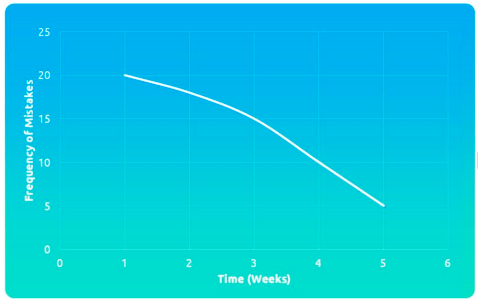
- The fear of appearing uninformed can hinder learning
- Without acceptance of mistakes, valuable teaching opportunities are missed
Overcoming cognitive challenges
- Cultivate
- The right mindset
- A supportive environment
- Clear, meaningful goals
- Additional strategies
- Take things slowly and in small, manageable chunks
- Vary your learning methods to maintain engagement
- Apply knowledge whenever possible
- Don't quit unless you've gained something from the effort
Persistence is key
- Set achievable goals
- Create a supportive learning environment
- Reflect on your progress
- Establish accountability
- Schedule protected time for learning
- Enlist a "cheerleader" or mentor for support and encouragement
Keep it interesting!
- Use a variety of learning formats
- Videos
- Books
- Webinar
- Articles
- Tutorials
Exploring learning styles
- Abstract vs. concrete
- Abstract: Focus on expertise and concepts
- Concrete: Emphasize hands-on experience
- Switch mediums
- Combine different formats like videos, books, live lectures, and group collaboration
- Send instead of receiving
- Teach others what you're learning - explaining a concept often deepens your own understanding
- Practice simplifying and explaining ideas in plain language
Summary
- The section covers the difficulty and challenges of learning something
- It focuses on persistence and long-term versus quick, short-term efforts
- Your personal needs and commitments will increase or ease your resistance so your foundations are in place
- Variety and accountability help to foster a commitment to learning and growing
Story - What to Learn When There Is Too Much to Know
Context
- The IT and DevOps landscape in 2024 is overwhelming - rapid change, constant evolution, and way too many tools and platforms to keep up with
- AI has dramatically shifted the game in just the past 18 months, automating tasks that used to require manual work
- Engineers today are expected to juggle everything from databases to Kubernetes, from CI/CD pipelines to multi-cloud deployments
- The sheer amount of tech knowledge out there creates confusion, especially for beginners who don't know where to start
- Learning everything is impossible - and trying to will leave you burnt out and stuck
- Success requires a focused, strategic approach to learning that balances current needs with long-term goals
Actions and result
- Focus on the present
- Learn only what's relevant to your current role or task - for example, if you're setting up GitLab CI/CD, go deep on that instead of exploring unrelated tools
- You perform better in your current role, feel less overwhelmed, and build real-world experience that matters now
- Build a strong foundation
- Start with core concepts (like basic Kubernetes) and then incrementally build on them - link each new tool or idea back to what you already understand
- You develop deeper knowledge over time without drowning in complexity, and retain information more effectively
- Stay strategic
- Spend 80% of your learning time on what you need now, and 20% on where you want your career to go - like security, SRE, or AI operations
- You build a career path, not just a random set of skills. You're not just surviving - you're growing toward your future
- Embrace meta-skills
- Intentionally improve in areas like communication, collaboration, and learning how to learn - things that aren't tech tools but are critical in the workplace
- You stand out as a more effective, well-rounded engineer who can thrive in fast-moving, team-driven environments
Quiz
| Number | Question | Answer |
|---|---|---|
| 1 | What is the purpose of the pre-assessment segment in the "Are you already someone open who adapts well?" slide? | To evaluate whether they are already a focused high-growth learner |
| 2 | According to the "Utilizing Resources for Enhanced Learning" slide, what does the wealth of resources and tools at our fingertips make learning? | More accessible than ever |
| 3 | In the post-assessment, how does the success imagery compare to the pre-assessment? | The post-assessment has more success images |
| 4 | What does the "Learning as a Driver of Business Success" slide explore? | How continuous learning directly contributes to achieving business objectives |
| 5 | According to the "The Power of Learning Habits" slide, what is cultivating strong learning habits in the fast-paced world of DevOps? | The key to staying ahead |
| 6 | According to the "Prioritizing Learning as a Key DevOps Value" slide, what is prioritizing learning about in DevOps? | Staying agile and responsive in a rapidly evolving field |
| 7 | According to the "Navigating Cognitive Challenges in Adult Learning" slide, learning new skills as an adult in a technical field like DevOps comes with | Unique cognitive challenges |
| 8 | What does the "Recognizing Opportunities for Growth" slide focus on? | Strategies for identifying and seizing learning opportunities |
| 9 | According to the "Stagnation Leads to Obsolescence" slide, what can failing to keep up with changes in DevOps lead to? | Skills becoming outdated, reducing competitiveness |
| 10 | What is the focus of the scenario video in the "Adapting to Change" section? | Common challenges encountered when faced with change |
| 11 | According to the "Goal Setting for Personal Development" slide, setting clear and achievable goals in the journey of continuous learning is | A roadmap to success |
| 12 | According to the "Embracing the Learning Curve" slide, what is crucial for success in the journey of acquiring new skills? | Understanding and embracing the learning curve |
| 13 | What does the "Committing to Lifelong Learning" slide encourage the audience to do? | Make a personal commitment to lifelong learning |
| 14 | What does the "Learning from Mistakes" slide explore regarding mistakes in the learning process? | The role of mistakes as invaluable learning tools |
| 15 | What does the "From State to Skill Acquisition" slide explain about the journey of learning in DevOps? | It is a transformative pathway from an internal state to tangible skills |
| 16 | What does the presentation in the "Establishing Rituals for Growth and Learning" slide focus on? | The concept of practices or rituals that promote personal and professional growth |
| 17 | According to the "Demystifying Skill Acquisition in DevOps" slide, what is important in learning new technologies and methodologies? | The importance of patience, practice, and persistence |
| 18 | What does the "Putting Knowledge into Action" slide focus on? | The importance of applying new knowledge and skills in practical settings |
| 19 | According to the "Cultivating a Mindset for Continual Improvement" slide, what will the presentation explore? | The importance of fostering a mindset geared toward ongoing learning and improvement |
| 20 | According to the "Beyond Technical Skills: Growing in Collaboration" slide, what is the power of soft skills like collaboration and communication? | Their importance cannot be overstated |
| 21 | What does the "Persistence and Practice" slide focus on? | The importance of persistence and consistent practice in mastering new skills |
| 22 | What does the "Mastering Innovation in DevOps" slide discuss regarding adopting new technologies? | It is essential for innovation and survival in DevOps |
| 23 | According to the "Exploring Diverse Learning Methods" slide, what can employing a variety of learning methods do in the diverse and dynamic landscape of DevOps? | Greatly enhance skill acquisition |
| 24 | What does the "Establishing a Consistent Learning Routine" slide emphasize about consistency in turning learning into a habit? | Consistency is key |
| 25 | What does the presentation in the "Embracing Continuous Learning in DevOps" slide introduce continuous learning as? | A foundational aspect of the DevOps culture |